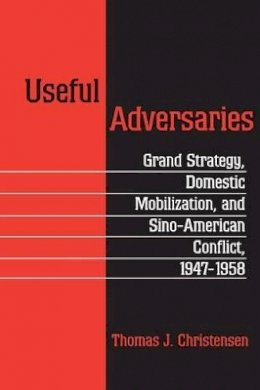
Stock image for illustration purposes only - book cover, edition or condition may vary.
Useful Adversaries: Grand Strategy, Domestic Mobilization, and Sino-American Conflict, 1947-1958
Thomas J. Christensen
€ 68.49
FREE Delivery in Ireland
Description for Useful Adversaries: Grand Strategy, Domestic Mobilization, and Sino-American Conflict, 1947-1958
Paperback. An analysis of why relations between the United States and the Chinese Communists were hostile in the first decade of the Cold War. It discusses questions such as why Truman refused to recognize the Chinese Communists and why Mao shelled islands in the Taiwan Straits in 1958. It provides a link between domestic politics and foreign policy. Series: Princeton Studies in International History and Politics. Num Pages: 352 pages, 1 halftone 16 line illus. 1 map 4 tables. BIC Classification: 1FPC; 1KBB; 3JJPG; HBJF; HBJK; HBLW; JPA; JPS. Category: (P) Professional & Vocational; (U) Tertiary Education (US: College). Dimension: 229 x 152 x 21. Weight in Grams: 485.
This book provides a new analysis of why relations between the United States and the Chinese Communists were so hostile in the first decade of the Cold War. Employing extensive documentation, it offers a fresh approach to long-debated questions such as why Truman refused to recognize the Chinese Communists, why the United States aided Chiang Kai-shek's KMT on Taiwan, why the Korean War escalated into a Sino-American conflict, and why Mao shelled islands in the Taiwan Straits in 1958, thus sparking a major crisis with the United States. Christensen first develops a novel two-level approach that explains why leaders manipulate low-level conflicts to mobilize popular support for expensive, long-term security strategies. By linking "grand strategy," domestic politics, and the manipulation of ideology and conflict, Christensen provides a nuanced and sophisticated link between domestic politics and foreign policy. He then applies the approach to Truman's policy toward the Chinese Communists in 1947-50 and to Mao's initiation of the 1958 Taiwan Straits Crisis. In these cases the extension of short-term conflict was useful in gaining popular support for the overall grand strategy that each leader was promoting domestically: Truman's limited-containment strategy toward the USSR and Mao's self-strengthening programs during the Great Leap Forward. Christensen also explores how such low-level conflicts can escalate, as they did in Korea, despite leaders' desire to avoid actual warfare.
Product Details
Format
Paperback
Publication date
1996
Publisher
Princeton University Press United States
Number of pages
352
Condition
New
Series
Princeton Studies in International History and Politics
Number of Pages
352
Place of Publication
New Jersey, United States
ISBN
9780691026374
SKU
V9780691026374
Shipping Time
Usually ships in 15 to 20 working days
Ref
99-2
About Thomas J. Christensen
Thomas J. Christensen is currently Assistant Professor of Government at Cornell University. He formerly held an SSRC/MacArthur Foundation fellowship in international peace and security and was an Olin National Security Fellow at Harvard University.
Reviews for Useful Adversaries: Grand Strategy, Domestic Mobilization, and Sino-American Conflict, 1947-1958
"[Christensen] makes a convincing and original argument that political leaders, in order to secure public support for their fundamental grand strategy, may have to adopt a more hostile foreign policy than they would prefer ... This volume is indispensable for anyone interested in Sino-American relations."
Foreign Affairs
Foreign Affairs
